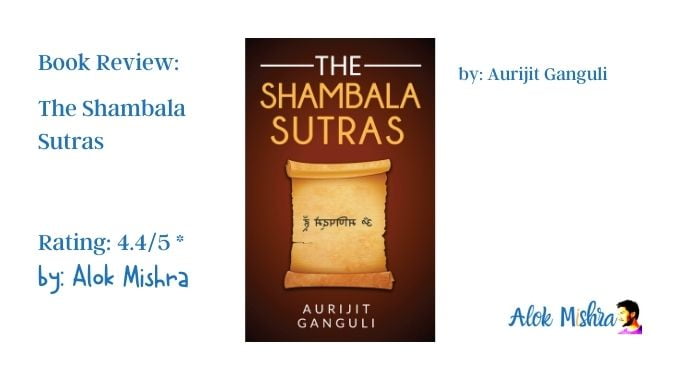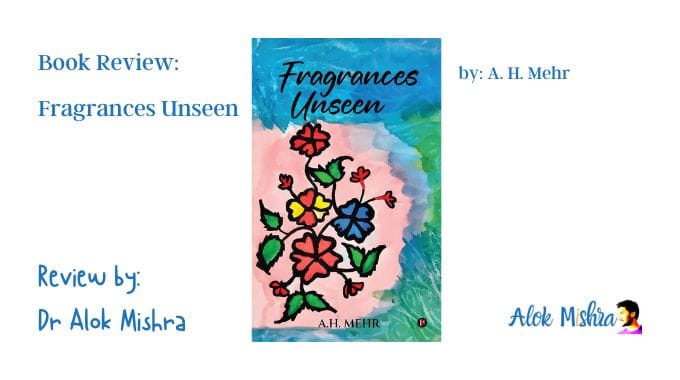A. H. Mehr’s Fragrances Unseen is an exquisite collection of poetry and prose that evokes…
The Shambala Sutras by Aurijit Ganguli: Book Review
Title: The Shambala Sutras
Author: Aurijit Ganguli
Genre: Mythology, History, Mystery
Publication: Paperback, Notion Press, 2020
Pages: 220
ISBN: 978-1648929816
Price: 250 RS

My educational background and also my interest, both, compel me to take a deep interest in Indian English literature and I have been reading novels by Indian novelists for more than 12 years now. I have seen the expected rise of novelists who came to the fore with their peculiar offerings. I have also witnessed emerging talents taking the audience into a world of wonders with their manoeuvres with history, mythology and religion… the present novel, by Aurijit Ganguli, The Shambala Sutras, is a work which can be said to have been modelled on the works by Amish or Ashwin Sanghi. However, once you begin reading the work, you will realise that the author has largely been original and the work has its own merits and demerits (if you may find).
The Shambala Sutras is a work that employs the tactics of folding and unfolding rapidly. You get to know one secret at one time and move to know another once the details scatter over the pages and you reconcile with the plot. This is the best way, I think, to keep the readers around the storyline. Aurijit has done the same. His novel digs deep into the ancient history of India and goes back to the origins, use and discovery of Sanjeevani of the Ramayan era. Arjun is our central male character who, along with Lisa, comes to India to find this herb. However, fate takes this pair of young scientific explorers to many other doors that they gleefully knock with a hope to explore ancient Indian wisdom – Shambala and its secrets, and eventually, discovering the ways to attain peace, satisfaction and enlightenment that enable people to connect with their inner self.
The novel has a straightforward storyline which is told in a third-person narrative by the novelist. Though the sections that describe notes, places, temples and other details (which are, in fact, revelations of the plot) are written more like a person explaining things to others, face to face.
Arjun’s bloodline will interest many readers because it connects the straightforward story of the discovery of Shambala to the twisted tales of Indian freedom struggle… around a figure who stirred healthy energy, patriotism and a hunger for freedom in Indians that, perhaps, no other leader could do. What is that connection?
The Shambala Sutras takes the level of excitements to another level with its narrative and secrets embedded in it, along with the progress of the novel, we keep discovering the secrets from time to time and these discoveries, in turn, keep our reading senses satisfied – getting to the end… a feeling is fueled with these halts as we move ahead with the story. This was new and I enjoyed it!
Technically, the novel could have been a little heavier in terms of the language. Usually, the novels I have read featuring ancient wisdom and secrets of our civilisation have been written in an embellished language. Well, Aurijit Ganguli has decided to keep his novel simple and I may guess the reason should be reaching to maximum readers. The storyline has been adequately organised in terms of encoding and decoding of secrets, twists and turns. The conclusion is striking and the readers will have something to remember. Yes, the novel could have been made magnanimous; however, at times, simple is better to communicate rather than making the message clumsily! I recommend this novel to every reader, across interest areas and across age group. Something new is here and it MUST BE READ!
Get a copy from Amazon – click here to get Paperback or Ebook
Review by Alok Mishra
The Shambala Sutras by Aurijit Ganguli: Book Review
- Alok Mishra's Verdict
4.4
Summary
An interesting novel that takes the readers to the world of Shambala, secrets around it and inside the wisdom that permeates on the Himalayan heights…
1.
The Shambala Sutras by Aurijit Ganguli: Book Review




This Post Has 0 Comments